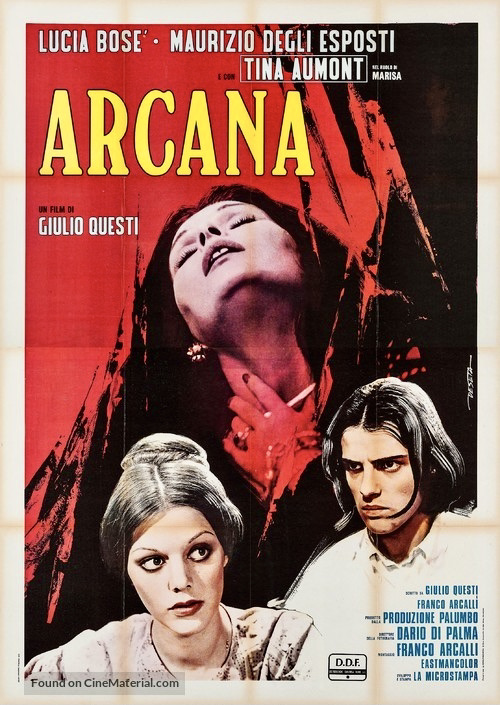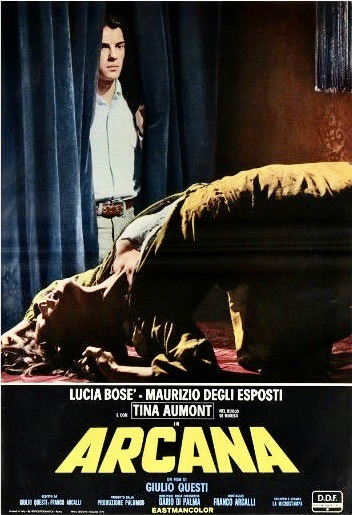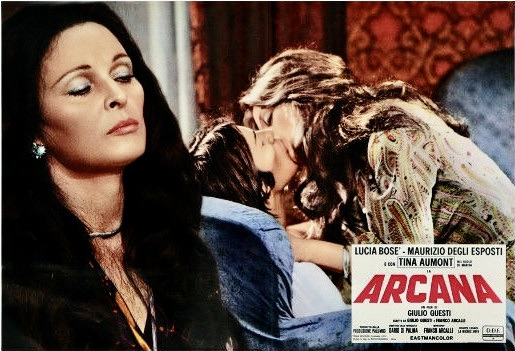People usually have certain expectations when they invest the time to watch a movie, especially if it has been advertised as a genre film like a western, sci-fi or horror thriller. This must have been a perplexing problem for the distributors of Arcana (1972), Guilio Questi’s mysterious tale of a widow and her brooding son who use fortune telling, tarot cards and seances to con a gullible clientele. The film dabbles in the supernatural but it also flirts with other topics like voyeurism, incest, Macedonian rituals, neglected children, middle class despair and inept bureaucracies. Some critics have pigeonholed Arcana as a horror film and it is certainly horrific in tone and attitude but don’t expect the movie to conform to genre conventions. The director even issues a disclaimer at the beginning: “To the watchers: This movie is not a story but a game of cards. For this reason both its start and the epilogue are not believable. You are the players. Play smartly and you’ll win.” Make of that what you will, I think Arcana works best as a puzzle, even if it is an often inscrutable and unsolvable one that is presented in two acts.
From the very beginning, Questi establishes a sense of the inexplicable. As odd happenings occur with more frequency, so does a sense of menace and unease. We first see a worker knock on a manhole cover and a man emerges to join his work team in assembling a tarp-covered work area around the hole. Instead of getting to work, the men huddle inside and spy on various pedestrians on the street, all of whom seem to be distracted by something up in the air. We don’t see what it is nor does this appear to connect directly with the main narrative which unfolds in an apartment in a drab working class neighborhood of Milan.
Several unrelated people have come to a designated address for an appointment with Madame Tarantino (Lucia Bose). She conducts group sessions in magnetic energy that is meant to exorcise the fears, anxieties or ailments of the paying customers. The madam is clearly a charlatan and her son (Maurizio Degli Esposti) is in on the ruse but she is clearly motivated by money while her son is disgusted by the whole operation. Since neither character is ever named in the film, I will refer to them as Madame and Junior for the sake of the synopsis.
The magnetic energy sessions conducted in Arcana look similar to a traditional séance with all the participants sitting in a circle with closed eyes and holding hands. At a certain point Junior emerges from behind a curtain and touches various clients on the head as if releasing something. After a second session, Junior reveals to his mother in private that several people in the group are doomed and will come to a bad end. “The woman with the flower dress, she will give birth to a deaf-mute child within six months,” he says. “That man which had the coffee is ferociously hated by his own family. Someone will bite his little child one day and the truth will finally be revealed.” This last statement proves to be prophetic when a certain someone captures a snake and lets it loose in the man’s home.

Junior turns out to be gifted with second sight much to his mother’s surprise. He is also the proverbial bad seed whose evil grows day by day. While his mother conducts private tarot card readings with wealthier patrons, he goes through their handbags or wallets. It’s not money he’s after but personal photographs which he rearranges in odd configurations in his bedroom, sometimes drawing circles around their heads in lipstick or gouging out their eyes with pins. Yes, Junior is a strange boy and he gets stranger by the day.
We see him making crazy faces at himself in the mirror and later parading around in a dressing gown with a stocking over his head and wearing a pair of falsies. Another brief scene shows him walking around naked in his mother’s high heels. The sexual confusion is further emphasized by scenes of him, semi-nude, cuddling with his mother in bed. The dynamic between mother and son, however, changes drastically when Junior becomes obsessed with Marisa (Tina Aumont, the daughter of Maria Montez and Jean-Pierre Aumont), one of Madame’s clients. She has anxieties about her upcoming wedding and wants Madame Tarantino to tell her future with the tarot cards. Marisa also reveals her desire to become pregnant and begs Madame to make a talisman for her that will ensure that wish.

If the first act of Arcana is like a slow descent into the irrational, act two goes completely bonkers with Questi serving up isolated sequences of seemingly possessed children, mass hypnosis and telekinesis (Junior can levitate dishes and other kitchen items with his mind). Marisa gets her talisman all right but Madame’s original charm is discarded and replaced by one of Junior’s making. We see him gathering the ingredients for it from a variety of unsanitary sites – weeds and dirt from cracks in the city streets, scrappingd from dead animals and rotting trash in the bowels of the subway (This is not an inviting postcard picture of Milan but something far more urban and industrial in appearance). When Marisa finally touches the talisman for the first time, she goes into convulsions and Junior has his way with her during her catatonic state. All of this leads up to a grand finale that includes Madame vomiting up frogs, a group of commuters trapped underground in a subway car and the military shooting down civilians in the street because a dwarf has unleashed mass hysteria in the city streets through an incantation.
What to make of all this? That is up to the viewer but Questi clearly seems to be dropping clues along the way and most of them hint at a society on the verge of collapse. The frequent scenes of unattended children roaming the halls of the apartment complexes suggests a future generation of potential sociopaths. A sequence showing working class folks lining up to get their monthly pensions reveals some grifters in the lot with one man pretending to be a cripple and using false ID papers to claim money owned to someone else. Meanwhile, unidentified authorities are seizing select people in the line and carting them off without any explanation. Who is scamming who? The city’s infrastructure is also clearly falling apart and the recurring scenes of a construction crew excavating a dank area for a new subway line is marked by constant tragedy with men being maimed or killed in unsafe conditions.

Arcana is a fascinating viewing experience even if it is sometimes opaque and impenetrable. Certain isolated scenes work extremely well as mini-freakouts or creepshow vignettes. In one, Junior leads a pack of kids on an apartment crawl that ends at a side street exit. He lures a curious passerby into the stairwell where the man is attacked by the gang. The kids bite his legs and arms while Junior holds him in a chokehold. Although he is finally allowed to flee in a state of total panic, Junior and the kids laugh gleefully as if terrorizing an adult produces a natural high.

Giulio Questi only has three solo directing credits in his filmography (his other work was in collaboration with other directors or on documentary shorts) – but his reputation rests on these three works. Django Kill…If You Live, Shoot (1967) is considered one of the most excessive and unconventional spaghetti westerns ever made. The violence is baroque and achieves an almost hallucinogenic quality with sets and lighting effects more appropriate for a horror film than a western. Django Kill deserves its cult reputation and then some, but Death Laid an Egg (1968), his next feature, was just as audacious and quirky. Often categorized as a giallo, it stands out from others in that genre by taking a scheming young couple’s murder plot and turning it into a delightfully wacko black comedy involving jet-set party games, mutant chickens and a business tycoon with a secret life as a fetishist of fake-murder reenactments. All of it is accompanied by Bruno Maderna’s Brazilian Bossa Nova-like score crossed with atonal choral and orchestral arrangements that would make Anton Webern proud.
Arcana, his final solo effect, is lesser known than the other two but deserves to be seen for its uncompromising, almost experimental approach to storytelling. Once again Questi has hired the ideal musicians – composer Romolo Grano and arranger Berto Pisano – to create an otherworldly score driven by a Hammond organ and featuring the voice of Edda Dell’Orso plus samplings of psychedelic and flamenco music. The cinematography by Dario Di Palma is deceptively lo-fi with a talent for finding the odd detail or an unexpected point-of-view shot that makes you rethink what you just saw. Di Palma was such a master craftsman that he could toggle back and forth between art cinema (1966’s Seasons of Our Love, Fellini’s The Clowns) and genre assignments (Perseus Against the Monsters, Blonde in Black Leather).
Questi seemed to thrive during a brief period in Italian cinema during the late sixties/early seventies when a handful of filmmakers addressed the turbulent times through extremely personal works that were radical, confrontational and rarely audience-friendly. The fact that they rejected conventional narratives and linear structures for a more intellectual art cinema approach meant that their films were doomed as commercial releases but these movies remain fascinating cinematic artifacts of their time, regardless of their pretensions and excesses. Certainly Marco Ferreri was one of the most controversial with his apocalyptic sci-fi allegory The Seed of Man (1969) and La Grande Bouffe (1973), a grotesque black comedy about four men who vow to commit suicide by overeating.

Even more polarizing is Carmelo Bene with his bizarre, highly theatrical costume epics like Our Lady of the Turks (1968) and Salome (1972), which seem closer in style and execution to the underground films of New York City filmmaker/performance artist Jack Smith. There was also the early work of Tinto Brass (before he turned to soft and hardcore exploitation) that yielded stream-of-consciousness, pop art curios like Nerosubianco (1969) and The Howl (1970). Franco Brocani’s Necropolis (1970), an avant-garde commentary on life and modern society was a notable one-off, and Giancarlo Cobelli’s Stop the World…I Want to Get Off (1970) utilized an absurdist comedy approach to its free-wheeling vignette format.
Yet, among all of them, Questi is unique for working within the Italian film industry with its restrictions and censorship and still managing to make atypical genre films that were provocative, enjoyably eccentric and occasionally subversive in subtle and not-so-subtle ways.
Arcana has never been released officially on DVD or Blu-ray in the U.S. but you can purchase a decent DVD-R of it from European Trash Cinema. It deserves to be remastered and exposed to a wider audience through a specialized distributor like Mondo Macabro or Cult Epics.
Other links of interest:
https://www.spaghetti-western.net/index.php/The_Unique_Worldview_of_Giulio_Questi_%E2%80%93_Part_1
https://www.theguardian.com/film/2020/mar/26/lucia-bose-obituary
http://www.tinaaumontseyes.com/remembering-tina-aumont-the-girl-with-the-eyes/










